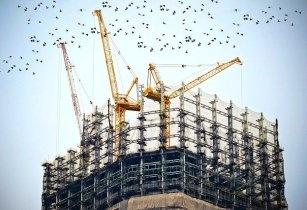The 2020 construction output growth forecast for the sub-saharan Africa (SSA) region has been revised down to 0.7 per cent from the previous pre-COVID forecast of 3.6 per cent, according to GlobalData
Yasmine Ghozzi, economist at GlobalData, commented, “Construction growth is expected to remain slow in 2021 before regaining strength in 2022. This, in part, reflects the expectation that budget spending in 2020 and 2021 will be focused on stabilisation, with some development projects being pushed back, and health sector spending being a priority as the novel coronavirus is exerting strong pressure on a national health that is not equipped to deal with major pandemics.”
South Africa’s construction industry to contract by 5.9 per cent in 2020
COVID-19 is expected to hit the region’s largest two economies, South Africa and Nigeria, in a context of weak growth and investment. This will adversely impact their respective construction sectors. GlobalData expects South Africa’s construction industry to contract by 5.9 per cent in 2020, and this negative impact will persist as the industry continues to be hit hard by the impact of high national debt, labor shortages and little infrastructure spending amid a depressed economy.
Nigeria’s construction industry to see 2.1 per cent decline
GlobalData has further cut its growth rate for Nigeria’s construction industry to -2.1 per cent (from the previous update of 1.3 per cent) in 2020, and foresees that weak public investment alongside limited foreign direct investment (FDI) amid the global economic downturn will push Nigeria into recession. Continued deficits in energy and transport infrastructure will also hinder the economy’s medium-term recovery.
Ghozzi commented, “The overall short-term outlook for Nigeria remains subdued as the intervention of OPEC+ and top oil-producing countries through output cuts has still not impacted significantly on oil prices or stabilised the market (the oil price recorded fluctuations in April and May), and if the pandemic lingers on, the Nigerian oil sector is predicted to contract further in the remaining quarters of the year, resulting in further revenue shrinkage for the government.”
Kenya’s construction sector to contract 3.1 per cent
GlobalData has cut its growth rate for Kenya’s construction sector to 3.1 per cent for 2020, and has cut Ethiopia ’s construction growth to 7.8 per cent in 2020 (down from the Q1 2020 update of 10.9 per cent) and 8.7 per cent in 2021.
Ghozzi added, “The weaker growth outlook for Ethiopia reflects the likelihood of a decline in project financing given concerns surrounding the completion of projects, exacerbated by a sharp rise in the country’s fiscal. Capital projects such as railway and road construction will gain momentum again from 2022 once the election is over (general elections as well as regional and council elections were supposed to be held in August but are now postponed due to the pandemic with no specific date) and global economic conditions normalise.”
Ghana’s construction sector revised down to -4.3 per cent
GlobalData has revised down its forecast for Ghana’s construction sector to -4.3 per cent in 2020 and -1.8 per cent in 2021 in real terms. Given that Ghana is an import-driven economy, COVID-19 is expected to negatively impact the country’s international trade and reserves, and the economy will suffer from a slump in government’s revenues, which will affect its ability to spend on development projects. The unplanned increase in expenditure, specifically in the health sector, could result in a sharp rise in public expenditure, which will result in a fiscal deficit of 6.6 per cent of revised GDP, higher than the de facto fiscal rule of five per cent set by the Fiscal Responsibility Law.





















